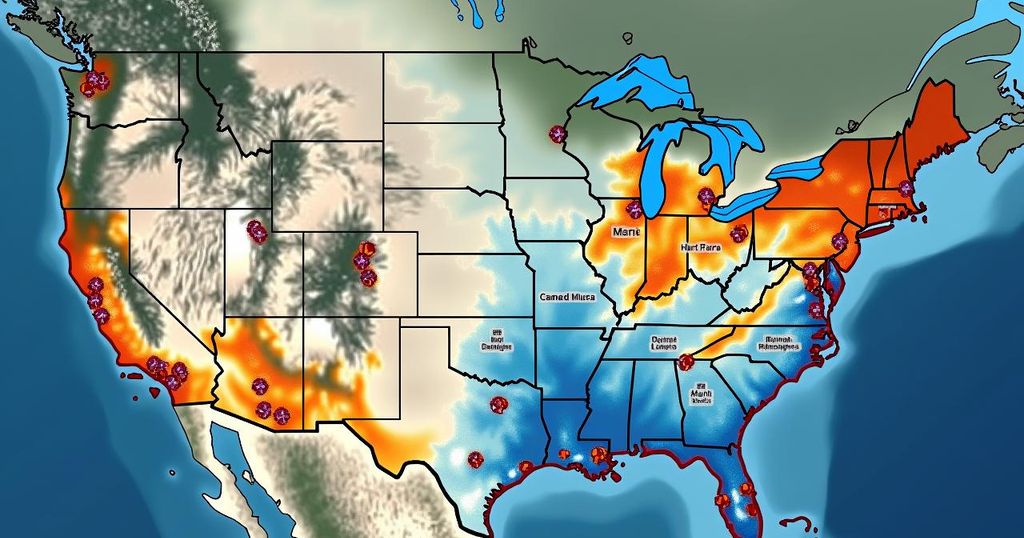Climate Change Intensifies Hurricanes: The Cases of Helene and Milton
A recent study revealed that climate change has boosted the rainfall and wind speeds of Hurricane Helene, with increases of approximately 10% and 11%, respectively. This trend is expected to continue with the impending Hurricane Milton as scientists warn of more frequent and severe storms due to global warming. Fatalities and devastation from Helene emphasize the need for increased emergency preparedness and a shift away from fossil fuels to mitigate the risks of future hurricanes.
Recent research indicates that climate change has significantly contributed to the intensity of Hurricane Helene, increasing its rainfall by approximately 10% and its wind speeds by around 11%. As Hurricane Milton approaches the Florida coast less than two weeks after Helene’s landfall, scientists predict similar enhancements in its intensity due to the warming climate. The analysis from the World Weather Attribution (WWA) suggests that warmer air temperatures, which can hold more moisture, have exacerbated rain and wind conditions for Helene. The hurricane’s wind speeds were elevated by 13 miles per hour, while the unusually high sea temperatures—ranging from 3.6°F to 2°C above average—were attributed to climate change, making such conditions 200 to 500 times more likely. Ben Clarke, a climate researcher from Imperial College London and co-author of the study, emphasized that, “Hurricane Helene and the storms that were happening in the region anyway have all been amplified by the fact that the air is warmer and can hold more moisture.” This situation indicates that Hurricane Milton is poised for similar intensification as it approaches land. The potential for more severe hurricanes, echoing the devastation of Helene—which resulted in significant inland flooding, widespread power outages, and over 230 fatalities—should serve as a warning. Helene brought about 40 trillion gallons of rain and wreaked havoc across the southeastern U.S. Hurricanes comparable to Helene, once projected to occur every 130 years, now have a 2.5 times increased likelihood of happening due to climate change. Comparative analyses indicate that Helene’s rainfall intensity over specific regions, such as Georgia and the Carolinas, has increased significantly—some areas experiencing a likelihood of rainfall increased by up to 20 times. Kim Cobb, director of the Institute at Brown for Environment and Society, noted the need for increased attention to emergency preparedness in light of the rising severity of such storms. She remarked on the urgency of addressing fossil fuel consumption to mitigate further climatic disruptions. As Hurricane Milton approaches, it highlights the pressing nature of climate-related impacts on weather patterns, reinforcing that human actions concerning energy systems will crucially influence future risks and costs associated with hurricanes.
Climate change is increasingly recognized as a critical factor affecting the frequency and severity of extreme weather events, including hurricanes. This phenomenon results from human activities, particularly the burning of fossil fuels and deforestation, which lead to elevated greenhouse gas emissions and subsequent warming of the planet. This warming increases the atmosphere’s capacity to retain moisture, leading to intensified precipitation and storm conditions. Consequently, hurricanes today are becoming more powerful, with studies indicating that the likelihood of hurricanes of a certain intensity occurring has significantly increased since pre-industrial times. Scientific analyses like those conducted by the World Weather Attribution utilize climate models and historical weather data to assess the influence of climate change on specific storms, guiding our understanding of the urgency for climate action.
In conclusion, the effects of climate change are profoundly altering the dynamics of hurricane formation and intensity, as exemplified by Hurricanes Helene and Milton. The escalating frequency and severity of such storms necessitate urgent discussions around climate mitigation strategies and enhanced preparedness to address the inevitable impacts of climate change on future weather events. The ongoing research highlights the critical role that human activity plays in shaping the future landscape of extreme weather, underscoring the need for immediate action to reduce fossil fuel dependency.
Original Source: phys.org




Post Comment